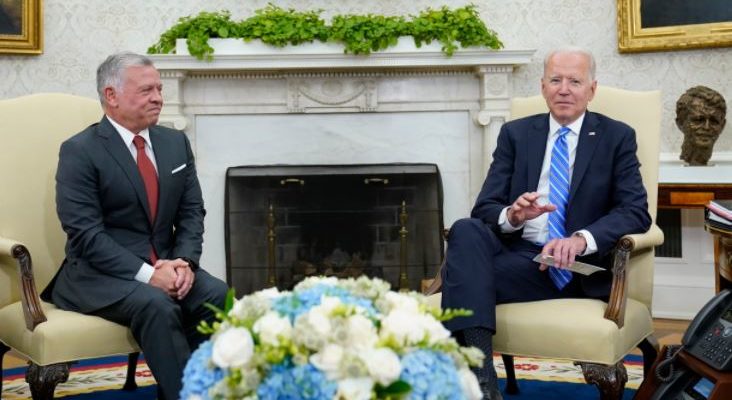Analysts view the meeting as a nod to the US administration’s commitment to the two-state solution and away from Trump’s Middle East peace plans.
By Meira Svirsky, World Israel News
Marking the first visit by an Arab leader to the White House since U.S. President Joe Biden took office, Jordan’s King Abdullah met with the president Monday.
While the White House billed the visit as an opportunity “to reaffirm the enduring strength of the partnership” between the two countries, analysts viewed the meeting as a nod to the U.S. administration’s commitment to the two-state solution for Israel and the Palestinians and away from former president Donald Trump’s Middle East peace plans.
Trump’s policy included recognition of Jerusalem as the capital of Israel and the Abraham Accords, which bypassed the Palestinians and, by extension, Jordan.
A senior administration official speaking on the condition of anonymity said Biden intended to tell Abdullah in private that he did not view the Accords as an “end run” to a peace deal with the Palestinians, Associated Press reported.
Palestinians account for more than 40 percent of Jordan’s population. A two-state solution, which includes the Palestinian expectation that Jerusalem will be the capital of any future Palestinian state, is looked upon as the king’s key to political survival.
Reading off cue cards, Biden thanked Abdullah for his country’s “enduring and strategic relationship with the United States.”
“You’ve always been there, and we will always be there for Jordan,” the president said.
“We also want to thank you for your vital leadership in the Middle East. You live in a tough neighborhood,” Biden added.
Abdullah noted that he had known the president before becoming king and while Biden was a senator. Speaking warmly, Abdullah waxed about “the privilege of knowing you with my father decades ago.”
The meeting comes at an opportune time for Abdullah to bolster his status both internationally and domestically. Saudi Arabia is mounting challenges to take over custodianship of the Temple Mount from Jordan. Meanwhile, a court in Jordan recently sentenced two former Jordanian officials (one also a Saudi citizen) to 15 years in prison over an alleged plot to overthrow the king.
Since 1994, when Jordan and Israel signed a peace treaty, the United States has been the largest provider of aid to the kingdom, a fact acknowledged by Lucy Kurtzer-Ellenbogen, director of the Israeli-Palestinian conflict program at the United States Institute of Peace, in The New York Times.





